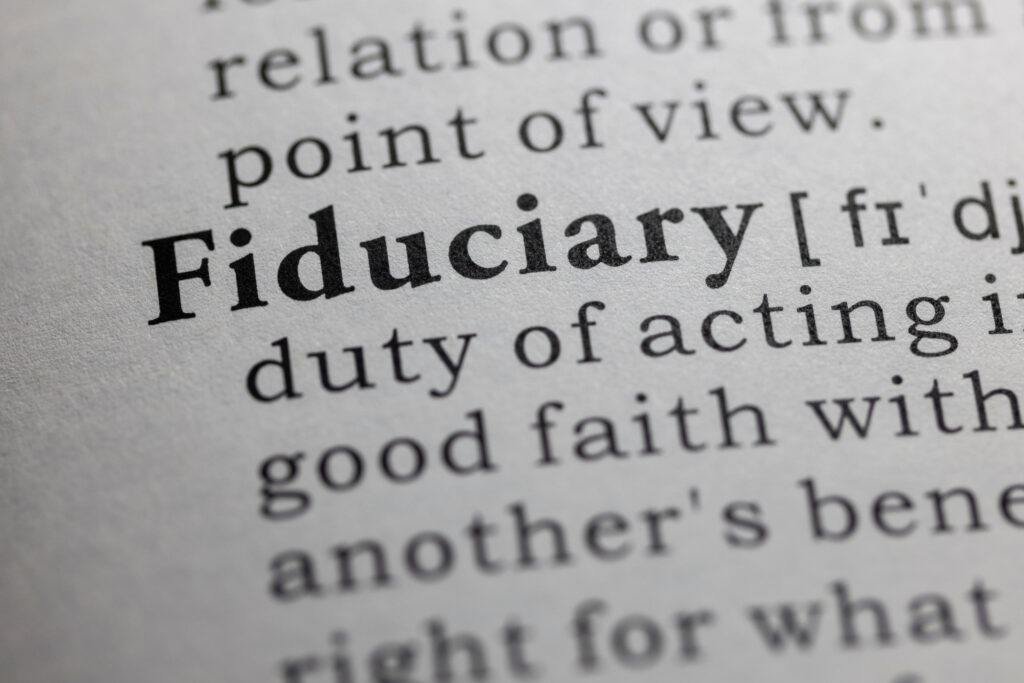Client Question: What is a Fiduciary?
August 10, 2023
While meeting with a prospective client earlier this week, he asked about a key differentiating factor in the world of financial advisors. Specifically, he asked what makes a financial advisor a fiduciary (which Windermere and its advisors are). This is an excellent concept for everyone to understand so let’s dive in

What is Fiduciary Duty & a Fiduciary?
Fiduciary duty is the legal and ethical obligation to act in the best interest of your clients/constituents. A person who is bound by the requirements of fiduciary duty is known as a fiduciary.
U.S. law and standards of professional conduct oblige fiduciaries to exercise a high standard of care, loyalty and honesty in providing services to their clients and stakeholders. The fiduciary is required to prioritize the interests of the beneficiary over their own.
Specific elements of fiduciary duty include:
*Put client’s best interests before their own, seeking the best prices and terms.
*Act in good faith and provide all relevant facts to clients.
*Avoid conflicts of interest and disclose any potential conflicts of interest to clients
*Do their best to ensure the advice they provide is accurate and thorough
*Avoid using a client’s assets to benefit themselves, such as purchasing securities for their own account before buying them for a client.
Fiduciary duty is a serious obligation. If a fiduciary doesn’t fulfill their duties, called a breach of fiduciary duty, the client could be entitled to damages.
Aren’t All Professionals Fiduciaries?
The general public assumes that all professionals (lawyers, doctors, and business executives as examples) operate under a fiduciary standard. Of course they would act in the best interest of their clients, right? It seems, on the surface, that the same thinking would be applied to financial advisors. Unfortunately, this is not the case.
Financial advisor is a very broad term and one that can encompass a lot of individuals and ways of conducting the business of providing financial advice. And regrettably, not all financial advisors are held to a fiduciary standard. It depends on the structure of the firm, the registration of its advisors, and the way in which they do business.
Any financial advisor registered with the Securities and Exchange Commission under the Investment Advisers Act of 1940 (known as a Investment Advisor Representative) and any firm set-up as a Registered Investment Adviser (RIA) is held to a fiduciary standard and will put client needs ahead of their own. (Note: Windermere is an RIA and Pam and Ken are IARs – all operating under the fiduciary standard). The majority of firms operating under the independent model (ie: not affiliated with a large broker/dealer are set up as RIA firms and are likely fiduciaries)
Other financial advisors may work for broker/dealers or other financials firms and be registered in a different manner. Often times, these individuals are not bound to a fiduciary standard. Rather, they operate under what’s referred to as a suitability standard – meaning their advice needs only be suitable for you but they do not have to ensure that it’s in your best interest (for instance, they could sell you the product with the higher commission to benefit themselves). Typically (but not always) these firms will be more focused on selling you products (think insurance, annuities, commission-based investment trading).
How do I know if my advisor is a fiduciary?
As you can see from above, it’s not at all clear and easy to identify “who is who” amongst the various registrations and industry jargon. So, as simplistic as it may seem – the best thing you can do is to ask the question directly. Ask the advisor “are you a fiduciary?” The answer should be a quick yes. If it’s a drawn out answer or a no, you may have some further questions to ask.
Do I Need to Work with a Fiduciary?
As is true for all elements of your financial journey, you need to seek the solutions that work the best for you and the decision is ultimately yours to make. However, give this specific decision a lot of attention. In my view, navigating your financial life is hard enough without worrying about whether the advice you are being given is in your best interest.
Leave a note